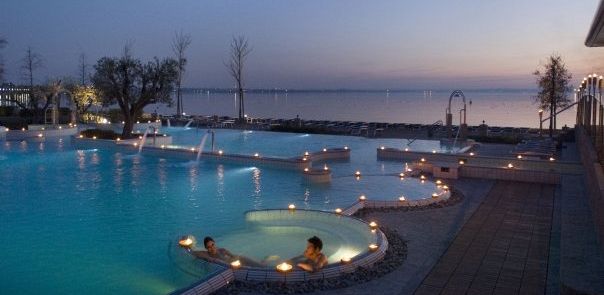Landschlacht, Switzerland, 12 April 2018
Of the problems that plague me, one of the biggest is persistence:
The ability to keep on keeping on.
I have to constantly remind and encourage myself that “a professional writer is simply an amateur who didn´t quit”. (Richard Bachman)
With my two blogs – this one and Building Everest – I have to remind myself that I cannot get people interested in what I have to say if I myself am uninterested in what I am saying.

In Building Everest I force myself each day to examine that day and ask myself what was interesting and unique about that day.
With this blog, which has (mostly) evolved into a travel blog in the two years since I´ve started it, I ask myself what was interesting about the places I visited and then I search for the words that will (hopefully) make you interested in (one day) visiting those places I´ve described.
As an English teacher I constantly remind my students that in all communication we must keep in mind one question: WIIFM.
What´s in it for me (the reader or recipient of this communication)?
Some places seem to sell themselves.
How many millions of words have been devoted to places like Paris or Venice?

And rightly so.
Others, especially the less known or least promoted places, need more time and imagination not only to convince you of their merits, gentle reader, but as well to convince me that writing about them is worthy of my time and effort.
Both blogs are practice, a honing process, the necessary training ground for developing the skills to becoming a paid published writer.
But what´s in it for you, gentle reader?
Two things (I hope).
First, I want you to see that you and I are similar in our shared humanity and desire to understand.
In a travel article, one does not burden the reader with prologues such as this one, but immediately hooks the reader into involving him/herself in the middle of the promoted place.
I include these Landschlacht prologues to show the process by which I write this blog and thus hopefully encourage you to share your world and experiences, for I don´t wish to write alone but rather as a voice in a united chorus.

Second, I want you to see what I see.
I not only want you to travel with me on my travels and share my experiences but I want to encourage you to travel and share your experiences and realize that travelling is not only a search to make the exotic seem familiar but as well it is the realization that the everyday familarity that surrounds us where we are is to someone else exotic.
I want to take you now, gentle reader, on a journey both in space and time.

I want you to come with me to a place that has drawn others to it for centuries, a place not so famous in international circles but beloved at least by her countrymen.
And as we travel I want to introduce you to a travel companion on this particular journey, a man confused about who he was and what he wanted – a man much like myself (and perhaps like you yourself) – who possessed a bravery – as uncharacteristic today as it was in his day – to openly express his feelings in a manner so candid that it still continues to shock the reader centuries later.
I want you to imagine him not as buried bones and forgotten words inside dusty tomes but as a living, breathing man walking beside us.
For his thoughts and feelings of yesterday are thoughts and feelings still thought and felt today.
Though time and progress have changed the place he once knew, there is much that remains that he could still relate to.
And much about the place and the man I hope that you can relate to.
Come with us now to Sirmione….
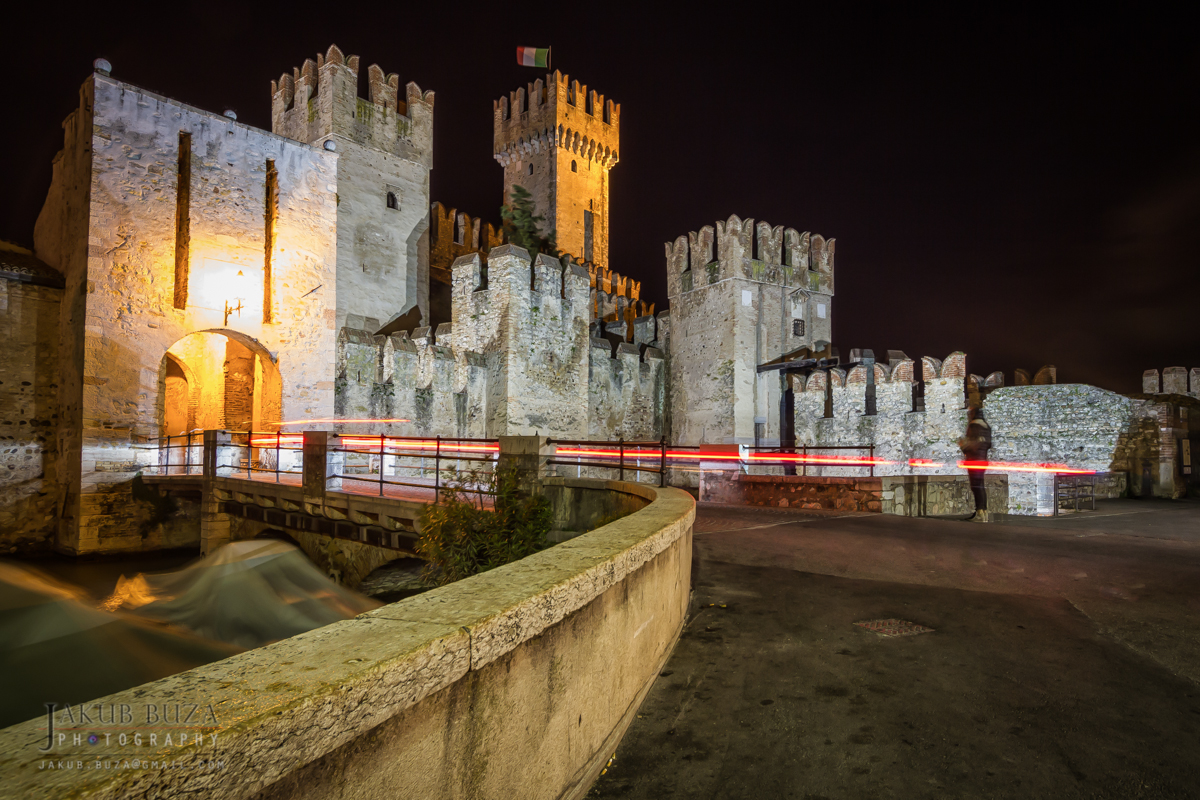
Sirmione, Lago di Garda, Italy, 4 August 2017
Lago di Garda is the largest, cleanest, least scenic, most overdeveloped and most popular of the Italian lakes.
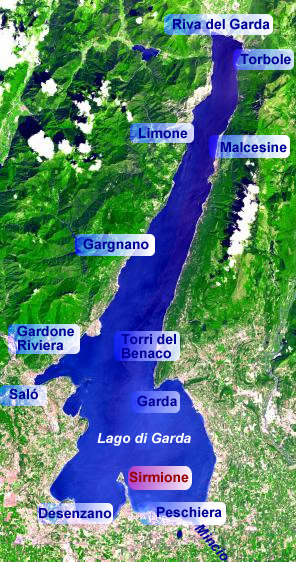
Lying between the Alps and the Po Valley, this 370 square kilometre pool of murky water is firmly on many tour operator schedules.
Garda enjoys mild winters and breezy summers.
The northern sover wind blows down the Lago from midnight through morning.
The southern ova wind breezes up the Lago in the afternoon and evening.
This temperate climate is, these Riviera Bresciana resorts are, invaded by large mobs of package holiday clients and locust-like throngs of Austrians, Germans, Italians and Swiss.
To the north, the Lago is hemmed in by mountain crags and resembles a fjord.
On the most sheltered stretch of the Lago´s western shore lush groves of olives, vines and citrus trees grow, resulting in olive oil, citrus syrups and Bardolino, Soave and Valpolicella wines.
As the Lago broadens towards the south, it takes on the appearance of an inland sea backed by a gentle plain.
The restless winds here have created one of Europe´s best windsurfing sites around Torbole and Malcesine on the eastern shore.
Within easy striking distance of the Milano-Venezia autostrada as well as rail and bus Connections from the main Lombardy towns, the southern shore of Lago di Gardo is particularly well-touristed.
Desenzano del Garda, the Lago´s largest town, is a major rail junction where buses connect with trains and several ferries ply their trade up to the northwest tip of the Lago and the town of Riva del Garda stopping off at other resorts on the way.
Desenzano doesn´t detain the visitor for long, though the lakefront is lined with bars and restaurants, though the castle has spectacular views and the Roman villa preserves some fine mosaics, the busy road running alongside and the constant traffic on the Lago is an everlasting siren call to leave that few can resist.
So, why linger?
Instead….
“Row us out from Desenzano, to your Sirmione, row!
So they rowed and there we landed – O pretty Sirmio!
There to me through all the groves of olive in the summer glow,
There beneath the Roman ruin where the purple flowers grow,
Came that “hail and farewell” of the Poet´s hopeless woe,
Tenderest of Roman poets nineteen hundred years ago,
“Brother, hail and farewell” – as we wandered to and fro
Gazing at the Lydian laughter of the Garda lake below
Sweet Catullus´s all-but-island, olive silvery Sirmio!”
(Alfred Tennyson)

Above: Lord Alfred Tennyson (1809 – 1892)
The Roman poet Catullus (87 – 54 BC) celebrated Sirmione, this narrow peninsula jutting out from the southern shore of Lago di Garda, as “the jewel of all islands”, thus his name is constantly invoked in connection with the place.

Above: Bust of Catullus, Piazza Carducci, Sirmione
Starting from the 1st century BC, Sirmione became a favourite resort for rich families coming from Verona, then the main Roman city in northeastern Italy.
Catullus praised the beauties of Sirmione and spoke of a villa he had in the area.
Sirmione remains a popular spot in a beautiful setting suffocated by luxury hotels, souvenir stands and tourists.
Go beyond the town battlements, away from the Rocca Scaliagara, that fairytale turreted fortress.

Escape, flee the throngs.
Walk out beyond the town to the peninsula´s triangular hilly head and lie in the shade of cypress and olive groves.
Linger not long, but pass San Pietro, for church frescoes won´t free you from the folks that follow you in search of food, alcohol, cool water and warm rocks.
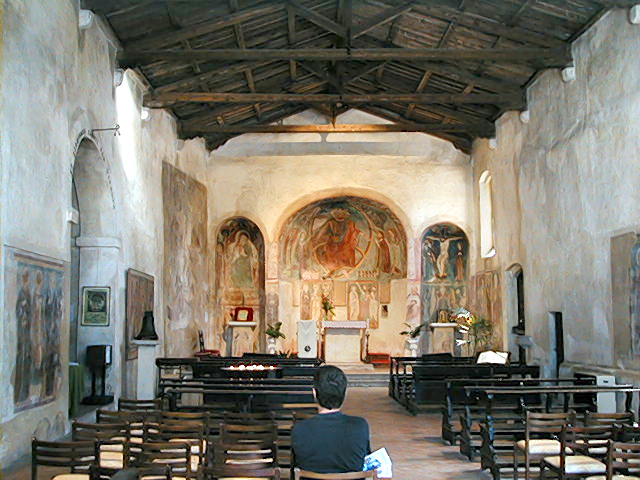
Boldly march, tracing the path that runs along the edges of the Peninsula.
Ignore the warning signs of slippery rocks and tumbling landslides and continue up to the gate leading to the Grotte di Catullo, where the locals brag was Catullus´ villa.
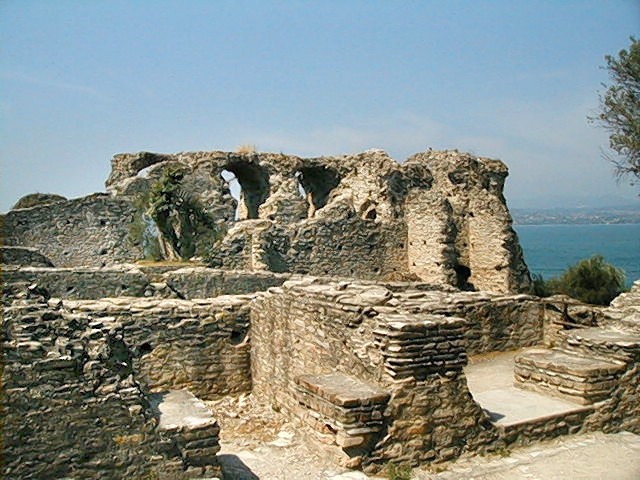
It wasn´t.
What this was, what this is, is the semblance of a Roman spa, white ruins where Romans came to take the waters from the hot sulphur spring that lies 300 metres under the Lago.
The scattered ruins, ageless and beautiful, bake quietly in the sun amongst ancient olive trees.
Fragments of frescoes and superb views of the Lago await the valiant wanderer.
We know from historical records that Catullus did retire to Sirmione, coming all the way from the Black Sea by boat, hauling it overland (!) when necessary so he could sail upon Lago Garda.
But what of the man Catullus and why do the folks of Sirmione insist he not be forgotten, even if his actual villa´s location remains uncertain?
For he was one of the Roman Republic´s greatest poets rivalling his contemporaries Lucretius and Cicero in the creation of a golden age of Latin literature.
62 BC, Rome
Quintus Valerius Catullus (22) had come to Rome from Verona, where his father was of sufficient financial and social standing to be frequent host to Julius Caesar himself.
Quintus himself owned villas near Tibur and on Lake Garda and had an elegant house in Roma.
Catullus speaks of these properties as choked with mortgages and repeatedly pleads his poverty, but the picture preserved of him by posterity through his poetry is that of a polished man of the world who did not bother to earn a living but enjoyed himself as a bon vivant among the wild set of the capital.
Despite his father´s friendship with Caesar, or because of this, Catullus – a familiar amongst Rome´s keenest wits and cleverest orators and politicians – opposed Caesar with every epigram at his disposal, unaware that his literary revolt reflected the revolutionary times in which he lived.
Catullus had tired of the old forms of Latin literature.
He wanted to sing the sentiments of his youth in new and imaginative ways.
Catullus was resentful of old morals perpetually preached by exhausted elders.
He announced the sanctity of instinct, the innocence of desire and the grandeur of dissipation.
He found life, love and literature revolved around every woman, married or not, who inspired him with comfortably casual love.
Catullus cultivated his friendship with the liveliest woman in his privileged circle, Clodia, whom he named Lesbia in memory of the Greek poetess Sappho of Lesbos whose works he translated, imitated and loved.

Above: Catullus at Lesbia´s, by Sir Lawrence Alma-Tadema
Quintus was fascinated by Clodia the moment she “set her shining foot on the well-worn threshold”.
She was his “lustrous goddess of the delicate step”.
Her walk, like her voice, was sufficient seduction for any man.
Clodia accepted Quintus graciously as one of her admirers and the enraptured poet, unable to match otherwise the gifts of his rivals, laid at her feet the most beautiful lyrics ever produced in Latin.
A lover´s frenzy raged within him….
“Sparrow, delight of my beloved.
Who plays with you and holds you to her breast?
Who offers her forefinger to your seeking
And tempts your sharp bite?
I know not what dear jest it pleases my shining one
To make of my desire!”
Quintus was consumed with happiness, paid attendance upon her daily, read his poems to her, forgot everything but his infatuation….
History does not record how long this ecstasy lasted, but she who had betrayed her husband for Quintus found it a relief to betray him for another.
Quintus madly envisioned her “embracing at once 300 adulterers.”
In the very heat of his love he came to hate her and rejected her protestations of fidelity:
“A woman´s words to hungry lover said
Should be upon the flowing winds inscribed,
Upon swift streams engraved.”
When sharp doubt became dull certainty his passion turned to bitterness and coarse revenge.
He accused her of yielding to tavern habitués, denounced her new lovers with obscene abandon and meditated suicide, poetically.
But Quintus was capable of more nobler feelings.
He addressed to his friend Manlius a touching wedding song, envying him the wholesome companionship of marriage, the security and stability of a home and the happy tribulations of parentage.
Quintus travelled to Bithyia (Black Sea coastal Turkey) to find the grave of a brother.
Over it he performed reverently the ancestral burial rites and soon afterward he composed tender lines….
“Dear brother, through many states and seas
Have I come to this sorrowful sacrifice,
Bringing you the last gift for the dead.
Accept these offerings wet with fraternal tears,
And forever, brother, hail and farewell.”
His time in Turkey changed and softened Catullus.
The skeptic who had written of death as “the sleep of an eternal night” was moved by the old religions and ceremonies of the East.
In a small yacht bought at Amastria (Amasra), Quintus sailed through the Black Sea, the Aegean and the Adriatic, up the Po Valley to Lago Garda and his villa at Sirmio (Sirmione).
“Oh, what happier way is there to escape the cares of the world than to return to our own homes and altars and rest on our own beloved bed?”
Men begin by seeking happiness and are content at last with peace.
Sirmione, Lago di Garda, Italy, 4 August 2017
Our bed and breakfast accommodation, adequate though not overly attractive – (much as women describe me these days!) – lay three kilometres from the centre of Sirmione.
As the B & B was destined to be beyond bus line access and my wife determined to save costs by our not employing taxis our three-day/two-night sojourn in Sirmione meant one hour´s walk between the B & B and the city centre.
We who had been driving everywhere that past week found ourselves wearily trudging back and forth alongside busy boulevards lined much like North American City access ways with anonymous forgettable shopping malls and restaurants forever ignored by the Michelin Guide.
Concrete under our feet, the lakeshore invisible and unattainable, carbon monoxide replacing sea breeze and breath.
Still we made the best of the Sirmione experience that we could.
We ate expansively, drank copiously, swam gloriously in the Lago and in the pools of the Terme di Sirmione spa and bathed ourselves in the warm Italian sun on unforgiving rocks.
We walked about Roman ruins searching for an ever-elusive emotional link with the ancient past.
One should not go to Sirmione in search of happiness but one can find contentment here.
Other English speakers did.
The Greek American soprano Maria Callas (1923 – 1977) had, like Catullus centuries before, a villa here.

Above: Maria Callas
The English writer Naomi “Micky” Jacob (1884 – 1964) moved to Sirmione because the weather was kinder to her tuberculosis-stricken lungs.
She was well-known in the town and her home was known as Casa Micky.
Micky wrote more than 40 novels and nearly a dozen autobiographies.
Her novels, best described as romantic fiction, tackled the problems of prejudice against Jews, domestic violence and the political consequences of pogroms in the 19th century.
Although not well-known nowadays, in her day Micky was a well-loved and much respected figure.
She, like Catullus´ poetic inspiration Sapphos, had intimate relationships with other women that were an open secret but never publicly disclosed during her lifetime.
She never gave up her home in Sirmione and died there in 1964.
Charles Schulz, the American creator of the famous Peanuts cartoons, on his way to Venice with his family lingered in Sirmione for a week in the 1950s.
He left against his heart describing Sirmione as “extraordinary”.

Above: Charles Schulz (1922 – 2000)
The Pace (pah-chay) Hotel in Sirmione occupies a building with a particularly significant history – the union of an old hotel (Hotel Eden) and the Santa Coruna religious institute for children with heart problems or for persons suffering from nervous complaints.
At a time when medicine wasn´t particularly evolved, the Lago di Garda was believed to infuse tranquillity and aid convalescence and healing.
Of the many visitors the Pace has hosted, including the aforementioned Charles Schulz, Catullus probably would have most connected with the American poet Ezra Pound (1885 – 1972).

Above: Ezra Pound
Like Pound, Catullus loved and hated in equal measures of extreme intensity, was capable of generous feeling, was unpleasantly self-centred, deliberately obscene and merciless to his enemies.
Both men danced poetically between love and lust, kisses and kaka, a mix of primitive coarseness with civilized refinement.
Their lines are salted with dirt to give literature taste.
Time magazine in 1933 described Pound as “a cat that walks by himself, tenaciously unhousebroken and very unsafe for children”.
During the winter of 1913 Ezra Pound was in Sussex (England) with William Butler Yeats, acting as the elder poet´s secretary.
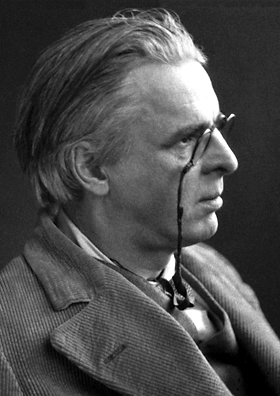
Above: William Butler Yeats (1865 – 1939)
Temporarily free of the rush of London, each was assessing the other´s work and laying out new directions.
When Pound had almost completed an anthology of new poets, he asked Yeats if there was anyone he had forgotten to include.
Yeats recalled a young Irish writer named James Joyce who had written some polished lyric poems.

Above: James Joyce (1882 – 1941)
One of them had stuck in Yeats´ mind.
Joyce was living in Trieste.
Why not write to him?
Pound wrote Joyce at once.
He explained his literary connections and offered help in getting Joyce published.
A few days later Yeats found Joyce´s “I Hear an Army Charging upon the Land” and Pound wrote again to ask Joyce if he could use the poem in his anthology.
Joyce, who had been on the Continent for nearly ten years, cut off from his nation and his language and so far all but unpublished, was surprised and encouraged.
He gave Pound permission to use the poem and a few days later sent a typescript of his book of short stories Dubliners and a chapter of a new novel called A Portrait of the Artist as a Young Man, along with news that he would soon have a play ready.
A prolonged correspondence began, which grew into a long-standing friendship.
Because of World War I, the two innovators of modern fiction and poetry would not meet until June 1920, when Pound persuaded Joyce to come to Sirmione.
If seen through Pound´s eyes, one wonders if the men were satisfied with the results of their meeting….
2 June 1920, Sirmione
“In vainest of exasperation
Mr. P passed his vacation.
The cause of his visit
To the Eyetaliann cities
Was blocked, by a wreck, at the station.”
“A bard once in landlocked Sirmione
Lived in peace, eating locusts and honey
Till a son of a bitch
Left him dry on the beach
Without clothes, boots, time, quiet or money.”
Sirmione, Lago di Garda, Italy, 4 August 2017
I think much about Pound and Catullus during our long walks to and fro between B & B and town.
I think about how both men resolved in their lifetimes to know more about poetry than any man living.
I think about how both men were really at heart very boyish fellows and incurable provincials, both driven by a thirst for romance and colour, who stumbled magnificently in their individual follies at great cost to themselves.
I think about how Clodia, Catullus´ lover, epitomizes today´s modern woman in her determination to lead her own life as she chose, free to love and be loved by whomsoever she desired, a woman who lived and loved with irresistable grace and whose greatest sin was not adultery or lechery as it was her underestimation of the effects that lovers wronged could enact upon her.
A woman´s body and soul are hers to decide how they are to be shared.
It is the dimmest of hopes that a mere man is worthy of being her sole obsession throughout her lifetime.
I think of how the love of a woman (19) caused Ezra Pound (58) to walk from Verona to the town of Gais, Switzerland, a distance of over 450 miles.
He was so dirty and tired when he arrived that his girlfriend Mary almost failed to recognize him.
The lengths that love drives a man….
I think of the lengths my own personal Lesbia has driven me over the past two decades, including the three-kilometre concrete trudge twice a day.
Perhaps marriage is a lot like Sirmione.
One might not always be made happy here, but one is usually contented.

Sources: Wikipedia / Will Durant, Caesar and Christ / Reay Tannahill, Sex in History / The Pace Hotel, Sirmione / The Rough Guide to Italy / Lonely Planet Italy


